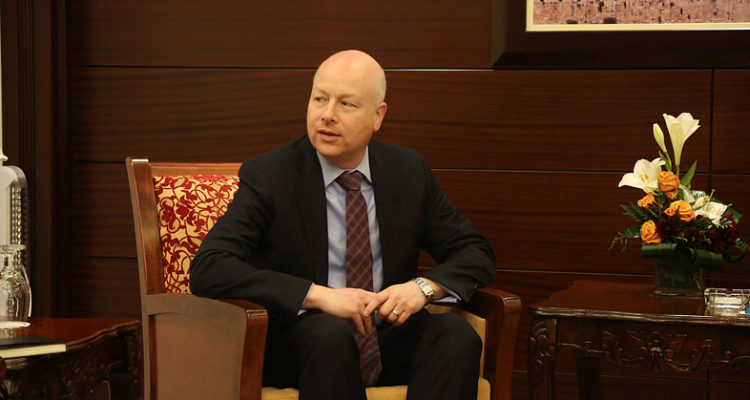By: Ariel Ben Solomon
Saudi Arabia is on a path to peace with Israel, but it needs to be given space to move at its own pace, former White House Middle East envoy Jason Greenblatt told JNS in an exclusive interview.
“These deals are complex and take a great deal of time, but any one thing could spark the right opportunity for a deal to actually be announced and quickly consummated, as we have seen,” said Greenblatt.
The New York-born son of Hungarian Jewish refugees, Greenblatt is a father of six who lives in Teaneck, N.J. He worked as a top lawyer for the Trump organization before becoming former President Donald Trump’s special envoy for international negotiations in January 2017, one of the few Trump officials charged with the Middle East file.
Greenblatt weighed in on his experiences negotiating on behalf of the Trump administration’s efforts towards Israeli-Palestinian peace and the Abraham Accords, as well as his thoughts on the Biden administration reviving the 2015 Iran nuclear deal (the Joint Comprehensive Plan of Action, or JCPOA ) and its critical approach vis-à-vis the Saudis.
He noted that in its first months, the Biden administration seems to be giving too much credence to the European position, even though the European Union was a main force behind what he called the “disastrous” Iran nuclear deal.
Below is the full text of questions and answers with Greenblatt:
Q: In your recent article in Newsweek, you seem to rebuke the Biden administration’s foreign policy that seeks a rapprochement with Iran at the expense of the moderate Gulf and Arab states, as well as Israel. How will this affect the peace deals between Israel and the Arab world that you helped orchestrate? Will it make their alliance stronger?
A: My position on whose voices truly matter on the Iranian threat has been clear. The Biden administration has put a great deal of emphasis on the Europeans being the relevant parties at the Iranian table.
While some of these European countries are relevant in the sense that they were involved in the disastrous JCPOA, and indeed they have a relationship with the Iranian regime which is helpful, the European outlook often is not aligned with ours or our important allies in the Middle East- Israel, Saudi Arabia, the United Arab Emirates, Qatar, Bahrain and Jordan.
It is our allies in the Middle East who are in the most danger from the Iranian threats, including nuclear, missiles, drones, proxies, terrorism and other malign activity. These countries should have a seat at the front of the table at all these meetings to ensure their voices are heard loud and clear.
Q: From Israel’s perspective, how should it pursue a peace deal with Saudi Arabia and some of the other Arab countries that have not done so yet? Will the current administration’s policies push Saudi Arabia and Israel closer?
A: These deals are complex and take a great deal of time, but any one thing could spark the right opportunity for a deal to actually be announced and quickly consummated, as we have seen.
Israel should continue to do what it is doing by being a force for good in the world and security in the region and elsewhere. Israel should walk tall and proud, and over time, more and more countries will realize that being Israel’s ally is a big benefit for so many reasons.
I think Saudi Arabia will get there, but we have to be patient and give Saudi Arabia the space it needs. Pressure from any party, including the U.S., will not yield a peace deal that is worth much or long-lasting. Peace will come when everyone is ready for it, for the right reasons. Encouragement is important, but pressure is not worthwhile.
Q: What do you make of the latest spat between Israel and Jordan, and the report that Jordan blocked its airspace to Netanyahu?
A: I don’t have the inside scoop on what actually happened, and I am not sure which news reports are accurate. But I think Jordan is not only an important ally of the U.S., it is an important neighbor to Israel.
I hope that Israel and Jordan work in good faith to repair that very important relationship. Rhetoric from some sectors turning this into a religious dispute is very harmful, and I doubt there is any truth to those stories. Frankly, if it were up to me, I would invite Crown Prince [Mohammed bin Salman] to visit Jerusalem and pray at the Al-Aqsa Mosque, and ensure that he has the security he is comfortable with.
Israel tries hard to do as good a job as possible to allow Muslims to worship at Al-Aqsa; in fact, it is Jewish worship that is forbidden. The more people understand that the better.
Q: What is the biggest misconception you observed in Washington circles and the foreign-policy establishment regarding the overall situation in the Middle East?
A: I will actually list several misconceptions because they are so important to understanding the conflict and its potential resolution.
First, that the Arab-Israeli conflict can only be solved when solving the Israel-Palestinian conflict. Perhaps that was true years ago. Clearly, it is no longer true for some countries, and hopefully, for many others. The conflicts are tied together, but can be broken apart and solved separately.
Another is the total acceptance of many of the Palestinians’ talking points as if they were valid, legally binding rights, such as their demand for all of East Jerusalem (including Judaism’s holiest sites) and that a peace deal must be largely based on the so-called 1967 borders, as if Israel is illegally occupying land that actually once belonged to Palestinians, as opposed to the land being disputed and claimed by Palestinians.
Or that other countries or groups of countries, such as the United Nations or the European Union, can demand a solution to the conflict out of Israel, as opposed to a solution to the conflict, if any, coming from direct, good faith negotiations between the parties. (JNS.org)






